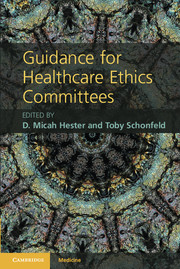Book contents
- Frontmatter
- Contents
- Contributors
- Preface
- Section 1 The Context of Healthcare Ethics Committee Work
- Section 2 Consultation
- 5 Mission, vision, goals: defining the parameters of ethics consultation
- 6 Ethics consultation process
- 7 Informed consent, shared decision-making, and the ethics committee
- 8 Decision-making capacity
- 9 Family dynamics and surrogate decision-making
- 10 Confidentiality
- 11 Advance care planning and end-of-life decision-making
- 12 Medical futility
- 13 Ethical issues in reproduction
- 14 Ethical issues in neonatology
- 15 Ethical issues in pediatrics
- Section 3 Policy Development and Organizational Issues
- Section 4 Educating Others
- Index
- References
10 - Confidentiality
Published online by Cambridge University Press: 05 August 2012
- Frontmatter
- Contents
- Contributors
- Preface
- Section 1 The Context of Healthcare Ethics Committee Work
- Section 2 Consultation
- 5 Mission, vision, goals: defining the parameters of ethics consultation
- 6 Ethics consultation process
- 7 Informed consent, shared decision-making, and the ethics committee
- 8 Decision-making capacity
- 9 Family dynamics and surrogate decision-making
- 10 Confidentiality
- 11 Advance care planning and end-of-life decision-making
- 12 Medical futility
- 13 Ethical issues in reproduction
- 14 Ethical issues in neonatology
- 15 Ethical issues in pediatrics
- Section 3 Policy Development and Organizational Issues
- Section 4 Educating Others
- Index
- References
Summary
Objectives
Deine confidentiality and privacy in healthcare, and identify applicable laws, regulations, and institutional policies.
Explain why privacy and conidentiality are important in the clinical setting and the harms that may result from breaches of them.
Describe behaviors or actions that respect, promote, diminish, or violate patient rights to privacy and conidentiality in healthcare settings.
Identify challenges that arise in protecting conidentiality and privacy, particularly between the desire to honor patient conidentiality and the duty to warn at-risk third parties.
Identify how to respect conidentiality and privacy in the ethics consultation process.
Case
Al lies unconscious following an automobile accident and is on a ventilator in the ICU. He is 35 years old and teaches economics at a local university. Al learned he was HIV+ 5 years ago. Since that time, Al has taken anti-HIV medications regularly and has received treatment from a local HIV clinic. According to medical records and the patient’s report, the medication has been effective in reducing his viral count to undetectable levels. Prior to this accident, Al had been experiencing no serious symptoms of the HIV infection, although on a few occasions he reported some physical fatigue. Al has a history of substance abuse, but has been drug free for over 5 years.
Al’s critical care team is considering a tracheostomy. However, Al’s family does not know about his HIV status. In fact, Al has discussed at length his refusal to disclose his status to his family members with his primary physician. He cited the way they treated him after they found out he had been using drugs, as well as how they treated his friends. He is certain that, if his family members knew he was HIV+, they would cut off all contact with him and he would lose their support.
How should the healthcare team proceed? Should a physician disclose Al’s HIV status to his family?
- Type
- Chapter
- Information
- Guidance for Healthcare Ethics Committees , pp. 71 - 79Publisher: Cambridge University PressPrint publication year: 2012



